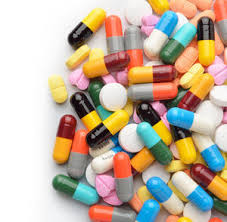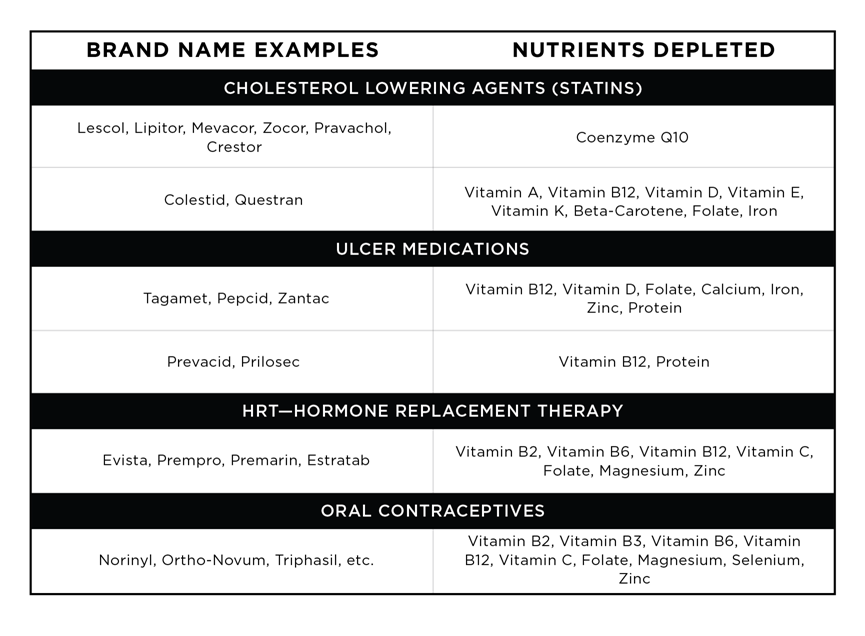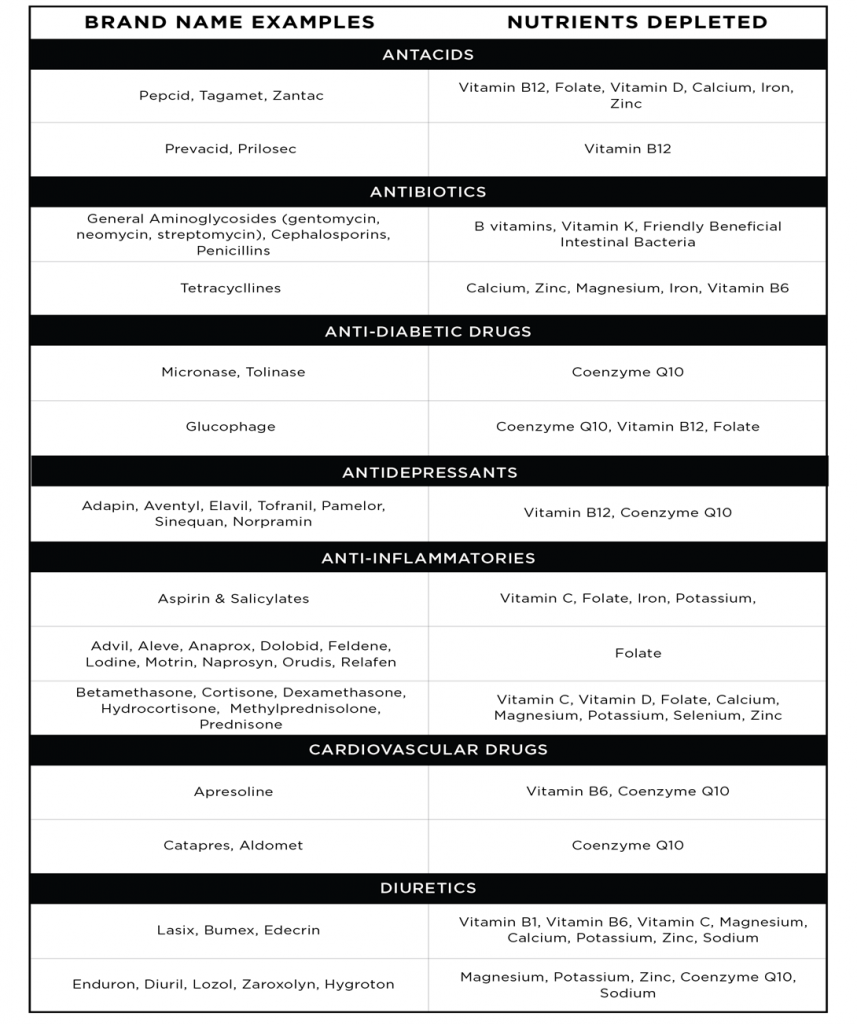

Chapter 4 in my book, Your Longevity Blueprint discusses several ways we become nutritional deficient.
Medications
Were you vaccinated as a child and have you taken any medications? I could write an entire chapter on how medications cause nutrient deficiencies. Shoot, Suzy Cohen, who is known as “America’s Most Trusted Pharmacist,” wrote an entire 371 page book on it! In Drug Muggers, she discusses how we take medications hoping they will make us feel better, yet we often end up feeling sicker (Cohen 2011). She understands that medications are needed to help reduce pain or help you breathe, for instance, but she also understands that drugs don’t cure anything (Cohen 2011). They simply help reduce symptoms. If we ate healthier, we likely wouldn’t need as many nutrients or the drugs for our symptoms. Pollen says it best, “Medicine is learning how to keep alive the people whom the Western diet is making sick” (Pollen 2008, 135).
Cohen’s whole book is about helping the patient stay safe on the medications they take. She coined the term “drug mugger,” which she defines as “an over-the-counter (OTC) or prescribed medication, food, herb, medical condition, or lifestyle choice that is capable of robbing your body’s natural stores of an important vitamin, mineral or hormone” (Cohen 2011, 7). And this “mugging” or depletion doesn’t just happen the day you take a drug—it can happen for weeks to months afterward. If you have high blood pressure, you have it for a reason, not because you lack blood pressure medication in your body. Unfortunately, when you take the blood pressure medication, you now lack other nutrients it has “mugged” you of. It is essential we replenish the nutrients that drugs steal from our bodies.
To review the drugs you take and the nutrients they deplete, check out Cohen’s very thorough book with her “nutrient security system.” She has a list of common drug muggers. Here are a few of special note:
- Statin drugs for cholesterol, blood pressure reducing and diabetic drugs deplete the body of CoQ10. Click here to view our COQ10 supplements.
- Diabetic drugs (such as metformin), antibiotics, and heartburn drugs (such as omeprazole or cimetidine) deplete the body of B vitamins, such as B12. Click here to view our MethylB complex.
- Blood pressure medications, heartburn drugs, antibiotics, and inhaled steroids deplete the body of magnesium. Click here to view our Magnesium Chelate.
- Diuretics make you urinate, depleting essential nutrients. Click here to view our Complete Multivitamins.
- Birth control medications deplete the body of B vitamins and magnesium. View our Methyl B complex and Magnesium Chelate.
- Antidepressants rob the body of B vitamins as well. If you are depressed, it’s likely that you are already low on nutrients, since they are essential for making neurotransmitters like serotonin. If you are then placed on an antidepressant, it further robs you of the vital nutrients you needed more of to begin with! Click here to view our MethylB complex.
- Thyroid medications can deplete you of calcium and iron. View our Calcium/Magnesium and Iron Chelate.
- Laxatives essentially make food go through you more quickly, so your body doesn’t have time for proper absorption. Click here to view our Complete Multivitamins.
- Antacids and acid blockers reduce acid, which is necessary for proper absorption. Long-term use of laxatives almost guarantees deficiencies. Click here to view our Complete Multivitamins.
- Antibiotics kill off good bacteria, allowing yeast to overgrow, which can also interfere with the absorption of nutrients. It’s essential to then replete your body with good bacteria. Click here to view our Probiotic complex.
Do you want to know more? Great resources for nutrient deficiencies caused by medications can be found on the SpectraCell Laboratories website.
Also, check out these graphics from my book Your Longevity Blueprint.

Lifestyle Toxins
In general, we live in a toxic world. Exposure to toxins requires higher nutrient levels to rid our body of these toxins (more on detoxing in the next chapter). Think of the artificial colors, flavors, and sweeteners in our foods. These are all toxins. They are difficult for our body to deal with. Personal care products also contain toxins that can tax the liver.
Alcohol and caffeine (coffee and non-herbal tea) also rob your body of nutrients. When you drink alcohol, it is metabolized or converted to acetaldehyde, which is highly toxic to your brain— that’s what causes a hangover. Coffee and teas contain tannins, which can leach minerals from your body. It’s no secret that caffeine has a diuretic effect. In addition, metabolizing these three all require nutrients. This means that when you drink alcohol, coffee, and nonherbal tea, you are increasing your need to supplement.
What about soda pop? Soda pop is highly acidic and high in phosphoric acid, which also leaches minerals like calcium from your bones to help neutralize or buffer the acidic pH. It is also high in other toxins, such as sugar, that depletes your body of minerals, and often high in high fructose corn syrup. The artificial sweeteners in most sodas contain excitotoxins, which damage your cells until they burn out and die.
Do you smoke? Toxins from cigarettes and marijuana deplete you of vitamin C. I see high levels of cadmium in many of my patients who aren’t even currently smoking, but who have a history of smoking. Have you ever taken OTC fat blockers for weight loss? These block your absorption of fats, even healthy fats. Exercising requires more nutrients. The harder you work out, the more nutrients your body uses up, and thus the more you need to obtain from food or supplements.
Further deficiencies can exist based on your diet if you are vegan or vegetarian. Even the area where you live in the United States can result in deficiencies. If you are pregnant, nursing, or elderly, your needs also increase. So, how do you truly know if you are low in nutrients? A functional medicine provider should be able to perform a physical exam and gather history and data suggesting what you need. However, the best way to know is to test!
Want to know what nutrients you need personally? Watch for my next blog on testing for nutritional deficiencies!
Can’t wait that long? Grab a copy of my book Your Longevity Blueprint today!


10399 Comments. Leave new